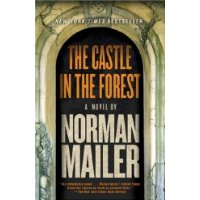| 商家名称 |
信用等级 |
购买信息 |
订购本书 |
|
|
 |
The Castle in the Forest: A Novel |
 |
|
 |
The Castle in the Forest: A Novel |
 |

基本信息·出版社:Random House Trade Paperbacks
·页码:496 页
·出版日期:2007年10月
·ISBN:0812978498
·International Standard Book Number:0812978498
·条形码:9780812978490
·EAN:9780812978490
·装帧:平装
·正文语种:英语
·外文书名:丛林中的城堡
内容简介 No career in modern American letters is at once so brilliant, varied, and controversial as that of Norman Mailer. In a span of more than six decades, Mailer has searched into subjects ranging from World War II to Ancient Egypt, from the march on the Pentagon to Marilyn Monroe, from Henry Miller and Mohammad Ali to Jesus Christ. Now, in
The Castle in the Forest, his first major work of fiction in more than a decade, Mailer offers what may be his consummate literary endeavor: He has set out to explore the evil of Adolf Hitler.
The narrator, a mysterious SS man who is later revealed to be an exceptional presence, gives us young Adolf from birth, as well as Hitler’s father and mother, his sisters and brothers, and the intimate details of his childhood and adolescence.
A tapestry of unforgettable characters,
The Castle in the Forest delivers its playful twists and surprises with astonishing insight into the nature of the struggle between good and evil that exists in us all. At its core is a hypothesis that propels this novel and makes it a work of stunning originality. Now, on the eve of his eighty-fourth birthday, Norman Mailer may well be saying more than he ever has before.
From the Hardcover edition. 作者简介 Norman Mailer was born in 1923 in Long Branch, New Jersey, and grew up in Brooklyn, New York. In 1955, he was one of the co-founders of The Village Voice. He is the author of more than thirty books, including
The Naked and the Dead; The Armies of the Night, for which he won a National Book Award and the Pulitzer Prize;
The Executioner’s Song, for which he won his second Pulitzer Prize;
Harlot’s Ghost;
Oswald’s Tale; and
The Gospel According to the Son. Mr. Mailer passed away Saturday November 10th, 2007.
From the Hardcover edition. 文摘 1
You may call me D.T. That is short for Dieter, a German name, and D.T. will do, now that I am in America, this curious nation. If I draw upon reserves of patience, it is because time passes here without meaning for me, and that is a state to dispose one to rebellion. Can this be why I am writing a book? Among my former associates, we had to swear never to undertake such an action. I was, after all, a member of a matchless Intelligence group. Its classification was SS, Special Section IV-2a, and we were directly under the supervision of Heinrich Himmler. Today, the man is seen as a monster, and I would not look to defend him—he turned out to be one hell of a monster. All the same, Himmler did have an original mind, and one of his theses does take me into my literary intentions, which are, I promise, not routine.
2
The room that Himmler used when speaking to our elite group was a small lecture hall with dark walnut paneling and was limited to twenty seats raked upward in four rows of five. My emphasis will not be, however, on such descriptions. I prefer to concern myself with Himmler’s unorthodox concepts. They may even have stimulated me to begin a memoir that is bound to prove unsettling. I know that I will sail into a sea of turbulence, for I must uproot many a conventional belief. A cacophony erupts in my spirit at the thought. As Intelligence officers, we often seek to warp our findings. Mendacity, after all, possesses its own art, but this is a venture that will ask me to forsake such skills.
Enough! Let me present Heinrich Himmler. You, the reader, must be prepared for no easy occasion. This man, whose nickname, behind his back, was Heini, had become by 1938 one of the four truly important leaders in Germany. Yet his most cherished and secret intellectual pursuit was the study of incest. It dominated our highest-level research, and our findings were kept to closed conferences. Incest, Heini would propose, had always bee
……




